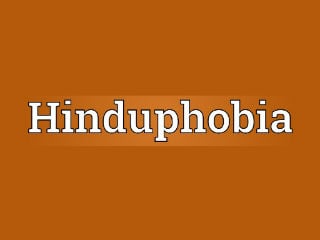US Research finds evidence of sharp rise in Hinduphobia on social media
 USA (13th July 2022) – Incidents of ‘Hinduphobia’ or anti-Hindu campaign are becoming quite apparent with India warning the world about its dangers, even anti-Sikh and anti-Buddhist phobias, at the United Nations, and calling upon more balanced discussions. Recently, researchers at Rutgers University in the US found evidence of a sharp rise in hate speech cases against Hindus on social media platforms. According to their analysis of 1 million tweets, Iranian trolls spread anti-Hindu stereotypes, memes to create division as part of their campaign to accuse the community of committing genocide on minorities.
USA (13th July 2022) – Incidents of ‘Hinduphobia’ or anti-Hindu campaign are becoming quite apparent with India warning the world about its dangers, even anti-Sikh and anti-Buddhist phobias, at the United Nations, and calling upon more balanced discussions. Recently, researchers at Rutgers University in the US found evidence of a sharp rise in hate speech cases against Hindus on social media platforms. According to their analysis of 1 million tweets, Iranian trolls spread anti-Hindu stereotypes, memes to create division as part of their campaign to accuse the community of committing genocide on minorities.
NCRI’s latest paper on “Anti-Hindu Disinformation: A Case Study of Hinduphobia on Social Media.” was released today on KQED/NPR
Rutgers Press Release:https://t.co/BXld0kRBJc
KQED report:https://t.co/9pyh27Iv1B
A 🧵 on our findings:@prasiddhaa_ @parthparihar @rachaelmyrow
— Network Contagion Research Institute (@ncri_io) July 13, 2022
“There is, unfortunately, nothing new to the bigotry and violence faced by the Hindu population”, said John J Farmer Jr, Director of the Miller Center and the Eagleton Institute of Politics at Rutgers University-New Brunswick. “What is new is the social media context in which hate messages are being shared. Our prior work has shown a correlation between the intensity of hate messaging over social media and the eruption of real-world acts of violence”.
‘Anti-Hindu Disinformation : A Case Study of Hinduphobia on Social Media’ details how popular modes of social media interaction such as memes, messages are being shared prolifically within extreme Islamist web networks on Telegram and elsewhere.
Hinduphobic code words and memes reached record highs in July, especially regarding religious tensions in India and the recent beheading of a man in Udaipur. Most social media platforms are unaware of the code words which are in the form of images, messages being used to spread hatred.
“Our hope is that the report serves as a timely warning before the hate messaging leads to real-world violence”, said Denver Riggleman, former US Congressman and Miller Center Research fellow and visiting scholar.
The analysis is based on reports by NCRI and Rutgers Centers released in 2020 that examine the use of conspiracy theories and social media to disseminate hatred and real-world violence.
Last year, departments of more than 50 US Universities, including Stanford, Harvard, Princeton, Cornell, organised a 3-day Global Academic Conference on the rise of Hindu nationalism. ‘Dismantling Global Hindutva Conference’ to look into the Hindu supremacist ideology was severely criticised by Hindu groups in India and abroad for being ‘Hinduphobic’ and demanded that it be cancelled.
Many, including Ohia State Senator Niraj Antani, Vishwa Hindu Parishad of America, the Coalition of Hindus in North America and the Hindu American Foundation had condemned the Conference and had said it paints Hindu ‘disproportionately and falsely as purveyors of extremism’.
Editorial Viewpoint
|